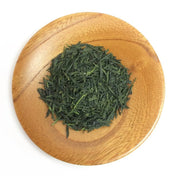Wazuka Town, nestled between rolling mountains and sleepy country roads, is a short drive from the glimmering prestige of Kyoto City. Accessible by bus, this charming town is slowly gaining the international recognition it deserves. For those interested in traditional Japanese culture, Wazuka is a hidden treasure. This Japanese tea town is a step back in time, priding itself on traditional tea production. Green tea has been a staple of the Japanese diet and social custom for centuries and Wazuka was one of the first places in Japan chosen to produce tea. Wazuka continues to celebrate it’s unique place in Japanese history.
This beautiful town is completely tea-centric, from the farms to the cafes and local celebrations. Wazuka is truly a tea lover’s dream. Get lost in the rolling hills of the lush tea plantations or relax in the slow countryside cafes. This region is not only famous for it’s remarkable teas, but also for its eccentric foods. When visiting Wazuka, don’t miss out on “chasoba,” traditional Japanese soba noodles made from buckwheat and tea leaves. These bright green noodles are especially popular in this town. Travelers can also find green tea based sweets and delicacies, such as dango (sweet Japanese dumplings), freshly prepared at the local cafes. Visitors can even enjoy green tea ice cream and beer. A trip to Wazuka will prove to be both educational and delicious!
Visitors are also encouraged to take part in a local tea tour. This is a rare opportunity to immerse yourself in tea culture and get a behind the scenes view of the farm and tea cultivation process. Tourists can witness how matcha is made, learn about different leaves and plants, and experience traditional Japanese tea ceremony. If you’d like, you can even request to wear traditional Japanese clothing while you enjoy your tour. Tea serving classes are available and can provide great cultural insight into the more complicated social aspects of preparing and drinking tea. Most plantation tours require advanced booking and generally last about 4 hours. Some tours even allow guests to partake in picking and processing the leaves themselves! A private tea tou r is the perfect educational opportunity for the tea enthusiast and the best way to escape the city. These tours aim to spread knowledge of Japanese culture to foreign visitors and act as a way to preserve this special culture.
r is the perfect educational opportunity for the tea enthusiast and the best way to escape the city. These tours aim to spread knowledge of Japanese culture to foreign visitors and act as a way to preserve this special culture.
Wazuka has a rich history of tea production, dating back to the Kamakura period (1199-1334). Green tea was originally imported from Chinese buddhist temples in the 12th century. Shortly thereafter, because of its convenient location and ideal climate, Wazuka was chosen to be a national pioneer of the early tea farm cultivation. Since then, these terraced tea fields have been a focal point of tea cultivation and cultural practice.
Today, there are more than 300 families that work every year to ensure Wazuka’s gorgeous tea fields continue to produce its celebrated beverage. Visitors to this charming town will be delighted by these evergreen shrubs all year round. In Wazuka, misty spring days are followed by brilliant summer sun, melting into warm autumn. If you’re lucky, you even see these plants dusted in snow on a nippy winter day.
Although the green tea grown in China is derived from a similar strain of the same plant, Japanese and Chinese teas are very different. These variations are due to differences in the post harvest handling process which stops the oxidation of the green tea. Green teas are produced from young tea leaves. The youngest leaves produce Sencha and the older leaves produce Bancha. During the Japanese style processing, these leaves are steamed and either rolled or ground into a powder. Rolled leaves create Sencha, ground leaves create matcha. Chinese green tea, on the other hand, is not steamed but dried in a pan over a fire. These variations in post harvest processing create unique taste distinctions. Most of the green tea purchased on the global market is Chinese, true Japanese green tea tends to be more difficult to find.
Interestingly, traditional methods, such as hand rolling tea, are still used in order to preserved the quality and refined flavor of the tea. This  year, there will be three Tea Picking and Rolling events held in Wazuka. Farm owners will welcome visitors to come once every harvest. In 2016, the events will take place April 29th, July 2nd, and September 23rd. Participants can experience a variety of activities from picking, to handing rolling, and tasting. Tea lovers will leave with a deeper appreciate of the work and expertise that goes into creating their aromatic beverages.
year, there will be three Tea Picking and Rolling events held in Wazuka. Farm owners will welcome visitors to come once every harvest. In 2016, the events will take place April 29th, July 2nd, and September 23rd. Participants can experience a variety of activities from picking, to handing rolling, and tasting. Tea lovers will leave with a deeper appreciate of the work and expertise that goes into creating their aromatic beverages.
Every year, there is a tea festival in Wazuka called “Chagenkyo Matsuri,” sometimes referred to as the Teatopia festival in English. Festival goers can experience traditional Japanese tea ceremony, witness live tea rolling, and enjoy a variety of tea centric cuisine and sweets. Roam the rolling hills of the tea plantations and enjoy the lush countryside scenery. The festival is free and is held annually during the first week of November. With over 800 years of tea history, these unique events are historical adventures.
Although the population of Wazuka, and Japan as a whole, is ageing, Japanese youths are finding interesting ways to incorporate tea culture into their own lives. Some of the local farms offer long term volunteer opportunities for both Japanese and foreign workers. These programs include residency options and generally last from 3 months to 1 year. These programs aim to educate individuals about the intricacies of tea cultivation while hoping to excite young people about continuing the tea tradition.
A trip to Wazuka Town is a unforgettable adventure. From the picturesque green tea fields unfolding down the mountainside, to the wealth of cultural experiences and artistry, Wazuka Town is a Japanese treasure. Take a journey off the beaten path and enjoy all that this gorgeous town has to offer. In recent years, the community members have been working to increase their international outreach programs.Global outreach is the best way of preserving traditional tea culture in an ageing population.
The post Social Sipping: Experience Japanese Tea Culture in Wazuka Town appeared first on YUNOMI.


